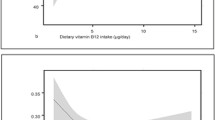Summary.
Background: Exclusion of animal products and having only plant protein in vegetarian diets may affect the status of certain B-vitamins, and further cause the elevation of plasma homocysteine concentration. Aim: The purpose of this study was to assess the status of homocysteine and related B-vitamins in vegetarians and nonvegetarians. The effects of biochemical parameters of B-vitamins and dietary protein on plasma homocysteine were also examined. Methods: The study was performed at the Chung Shan Medical University, Taichung, in the central part of Taiwan. Thirty-seven vegetarians (28.9 ± 5.5 y) and 32 nonvegetarians (22.9 ± 1.6 y) were recruited. Nutrient intake was recorded using 3-day dietary records. Fasting venous blood samples were obtained. Plasma homocysteine, folate and vitamin B-12 were measured. Vitamin B-6 status was assessed by direct measures [plasma pyridoxal 5'-phosphate (PLP) and urinary 4-pyridoxic acid (4-PA)] and indirect measures [erythrocyte alanine (EALT-AC) and aspartate (EAST-AC) aminotransaminase activity coefficient]. Results: There was no significant difference in vitamin B-6 intake between the two groups, although the vegetarian group had a significantly lower vitamin B-12 intake than the nonvegetarian group. Vegetarian subjects had significantly lower mean plasma PLP and vitamin B-12 concentrations than did nonvegetarian subjects (p < 0.05); however, a significantly higher mean plasma folate concentration was found in the vegetarian group. Vegetarian subjects had a significantly higher mean plasma homocysteine concentration than nonvegetarian subjects (13.2 ± 7.9 vs. 9.8 ± 2.2 μmol/L). Negative correlations were seen between plasma homocysteine and vitamin B-12 concentrations in the vegetarian (p = 0.004), nonvegetarian (p = 0.026), and pooled (p < 0.001) groups. From best subsets regression analyses, the plasma homocysteine concentration could be significantly predicted by total protein intake (p = 0.027) and plasma vitamin B-12 concentration (p = 0.005) in the pooled group. When the intake of protein is not considered, vitamin B-12 concentration is still a strong predictor of plasma homocysteine concentration (p = 0.012). Conclusions: Vitamin B-12 intake and mean plasma vitamin B-12 concentration were lower for vegetarian subjects than for nonvegetarian subjects, leading to an increase in plasma homocysteine concentration. Vitamin B-6 and folate had little effect on plasma homocysteine concentration when individuals had adequate vitamin B-6 and folate status.
Similar content being viewed by others
Author information
Authors and Affiliations
Additional information
Received: 15 July 2002, Accepted: 24 October 2002
The study was supported by National Science Council (NSC 89–2320-B-040–046), Taiwan.
Correspondence to: Y. C. Huang
Rights and permissions
About this article
Cite this article
Huang, YC., Chang, SJ., Chiu, YT. et al. The status of plasma homocysteine and related B-vitamins in healthy young vegetarians and nonvegetarians. Eur J Nutr 42, 84–90 (2003). https://doi.org/10.1007/s00394-003-0387-5
Issue Date:
DOI: https://doi.org/10.1007/s00394-003-0387-5




